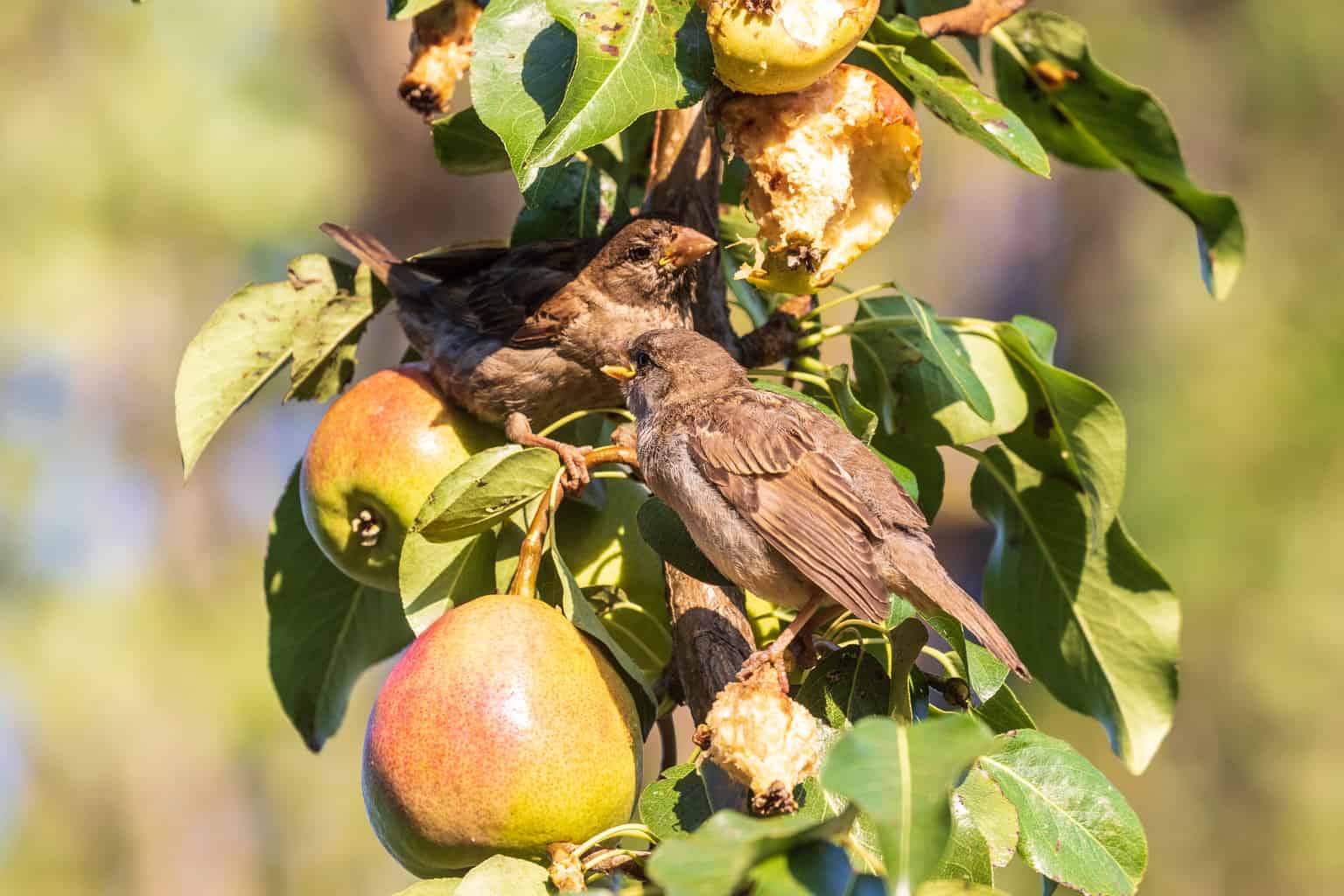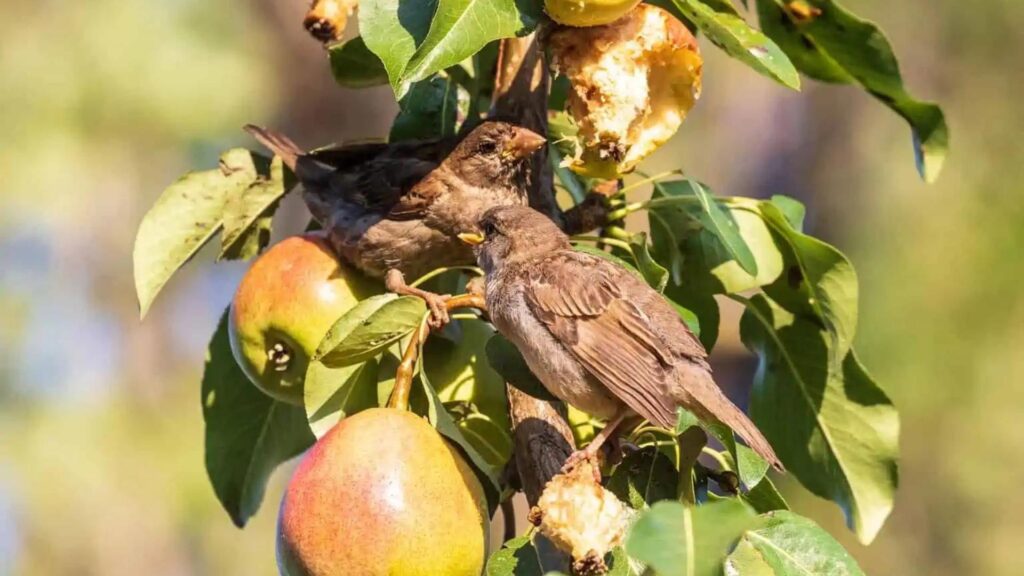Birdwatchers are always looking for new ways to feed birds, especially when it can help them avoid wasting food.
But, can birds eat pears? Let’s explore whether you can throw your leftover pears to the birds in your backyard.
Save this article for later so you don't lose it. Enter your email and I'll send it to you now—plus you'll get my favorite backyard birding tips delivered to your inbox.
Wild Wings WWCF23 Cedar Hanging Bird Feeder
Check PriceAre Pears Safe for Birds?
You may have heard that the seeds of fruits like apples and pears contain amygdalin, which is converted into hydrogen cyanide, a highly poisonous chemical, after consumption. While this is true, it’s not as scary as it sounds.
According to Britannica, you don’t need to worry if you swallow some seeds from time to time. The average adult would need to eat somewhere between 150 and several thousand crushed or chewed apple seeds in order to be at risk of cyanide poisoning.
Seeds swallowed whole don’t release cyanide at all, according to Britannica, and the amount of cyanide in your system from a couple of crushed seeds won’t cause any problems.
Researchers from the University of Leeds found the amygdalin content of pears to be less than half that of a Royal Gala apple. Pears contain 1.29 mg/g of amygdalin, while Gala apples contain 2.96 mg/g.
Green plums and apricots had far higher ratios of amygdalin (17.49 and 14.37 mg/g, respectively).
So ultimately, the answer to whether birds can safely eat pears is that yes, they can. Birds are smaller than humans, but a pear seed or two isn’t likely to poison any birds.
If you want to remove the seeds before putting out chunks of pear for the birds to eat, you can do so for your peace of mind.
Do Birds Eat Pears in the Wild?
Birds will eat pears from pear trees in the wild. Birds are largely responsible for the spread of an aggressive pear fruit tree species, the Callery pear.
They eat the pear and its seeds and then deposit the uncrushed seeds across the landscape in their feces. This causes new pear trees to grow wherever the birds fly to after eating the fruit.
Avoid Processed Pears
If you’re putting out pears, it’s probably advisable to stick to fresh fruit, although that doesn’t mean it has to be perfect. Fruit that’s starting to get a little bit bruised, old, or soft can still be eaten by birds.
Get our free Hummingbird Attraction Guide! Plus, we'll send you our best tips for attracting more birds to your yard.
According to the UK-based RSPB Wildlife Charity, apples and pears, including those that are bruised and partly rotten, are popular with thrushes, tits, and starlings.
If the birds don’t take to the pear quickly, it’s best to throw it away, however. Leaving out rotting fruit for too long, especially on warm summer days, is a recipe for bacteria buildup, mold, and a generally messy situation.
In general, avoid pears with extra added sugar, preservatives, or ingredients intended for humans. This rules out things like many cooked or canned pears and diced pears in high-fructose corn syrup.
Birds don’t need the extra unnatural ingredients included in many human foods, and some may even be toxic, such as chocolate.
Other ingredients like salt and sugar might not be toxic, but they aren’t good for the birds.
Will Birds Eat Pears?

Even if you give them access to pears, it’s not a sure thing that birds will eat them. Some birds don’t care for fruit, while others do. But if it’s not a regular food that they’re used to receiving, it may go uneaten in favor of more recognizable items.
As mentioned before, starlings, thrushes, and tits may be among the birds that could enjoy eating pears.
Some birds will eat unripe pears, and others will eat ripe pears or even pears that have begun to get old and soft, as mentioned above.
Bird watching and feeding is largely trial and error. What works for one person and the birds in their yard may not work for someone else.
Frequently Asked Questions
Should You Use Bruised Pears or Fresh Options?
Bruised pears are ultimately OK, as long as they’re not getting moldy or too rotten. If they sit out for too long and begin to get soft and mushy, it’s time to throw them away in order to reduce the spread of disease and avoid having to clean up a big mess.
Can Birds Eat Cooked Pears?
Avoid cooked pears, as they come with unnecessary levels of sugar that can be difficult to digest for certain birds. While some birds have no problem digesting sucrose, others can’t do it, including robins and thrushes.
Smithsonian Ornithologist Gary Graves explains in Smithsonian Insider that too much sugar gives the birds diarrhea. That’s not good for the birds, and it’s certainly not ideal for you in keeping your yard and belongings clean and bacteria-free.
Can Birds Eat Prickly Pears?
Yes, birds can eat prickly pears. Prickly pears are the fruit of multiple cacti species that make up the Opuntia genus. According to the Galapagos Conservation Trust, there are over 200 species of prickly pear that grow across the Americas.
Species of prickly pear cactus have been found in northern states such as Wisconsin and the Upper Peninsula of Michigan and can survive more strenuous winters than many other cactus species.
According to the Galapagos Conservation Trust, six of the 200 prickly pear species grow in the Galapagos Islands. These are commonly eaten by birds like doves, cactus finches, and mockingbirds.
In the Sonoran desert of the American Southwest, Gila woodpeckers feed on cactus fruits as well.
What birds feed on prickly pear near you will ultimately depend on your location.
Give Pears a Try
While we can’t be certain that your backyard birds will enjoy pears, they’re certainly a safe food option. Give it a try and see what your feathered friends think of this treat.


